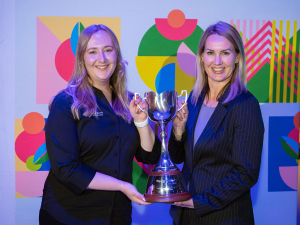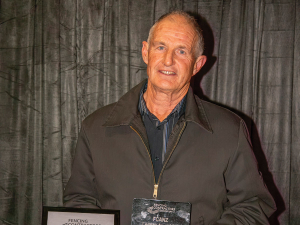Following a recent tour of Bruce Woollen Mill, Wool Advancement Group (WAG) chairman Michael Mellon says there appears to be an opportunity in organic wool which was being largely ignored.
Lanolin is almost treated as a waste by-product. This is unfortunate as there are excellent top-end organic markets for the product.
Lanolin is the ‘grease’ left behind after wool is scoured. The scouring equipment needed is in place at the mill though it could require some realignment of plant.
Mellon says the review of organic wool was undertaken by WAG. It identified niche opportunities that were being ignored because of issues such as the number of smaller lots, each with different specification.
However, none of these issues is insurmountable: the answer for smaller wool operators could be aggregation.
Mellon says the traditionalists pointed out that there is more-than-adequate lanolin product available, in a natural state, from Russia or underdeveloped countries. However, this usually is from wild animals, and though it is free of fertiliser, drench and dip, the wool is irregular in quality and during transit often exposed to contaminants.
Mellon believes garment makers, and in time carpet makers, will require assured organic suppliers to meet their commitment to end users. He says consumers are prepared to pay a premium for assured organic product. This will be passed down through all stages of production to offset extra costs such as certification.
Availability in New Zealand of organic wool is not well known, as significant imports of organic wool from Germany continue.
Cavalier Wool Scourers have for several years been offering certified scouring using readily available bio-degradable detergent.
Certification is offered to Bio-grow and Assure standards by Cavalier in South and North Island for superfine Merino through to 40 micron crossbred.
Mellon says reliable sources have indicated that costs are no higher than standard wool – even with the administration costs of certification.
One farmer claimed that wool growing costs were actually lower for organic product. This is due to no costs for chemicals such as drenching, vaccinating, dipping, superphosphate and nitrogen.
There are, however, costs for the extra cleaning of the scours and clearing of cards to comply with Biogro/Assure regulation.
Aggregation of raw wool from small growers is essential to avoid extra surcharges at all levels of the supply chain. It’s anticipated such an aggregation could be initiated by local organic farming groups.
WAG research found the USA was not particularly organic-minded when it came to wool, with a total output of 19,000kg organic wool. As USA sheep flocks are mainly strong wool breeds, in time the demand would grow. Baby clothes, knitting yarn and socks were the main organic uses.
Mellon says it’s disappointing the traditional wool trade seems to do little to aid organic wool in its infancy.
But finding markets with potential garment makers should not be too difficult, as quality makers wishing to add a valuable selling point will be few and easy to identify.
















